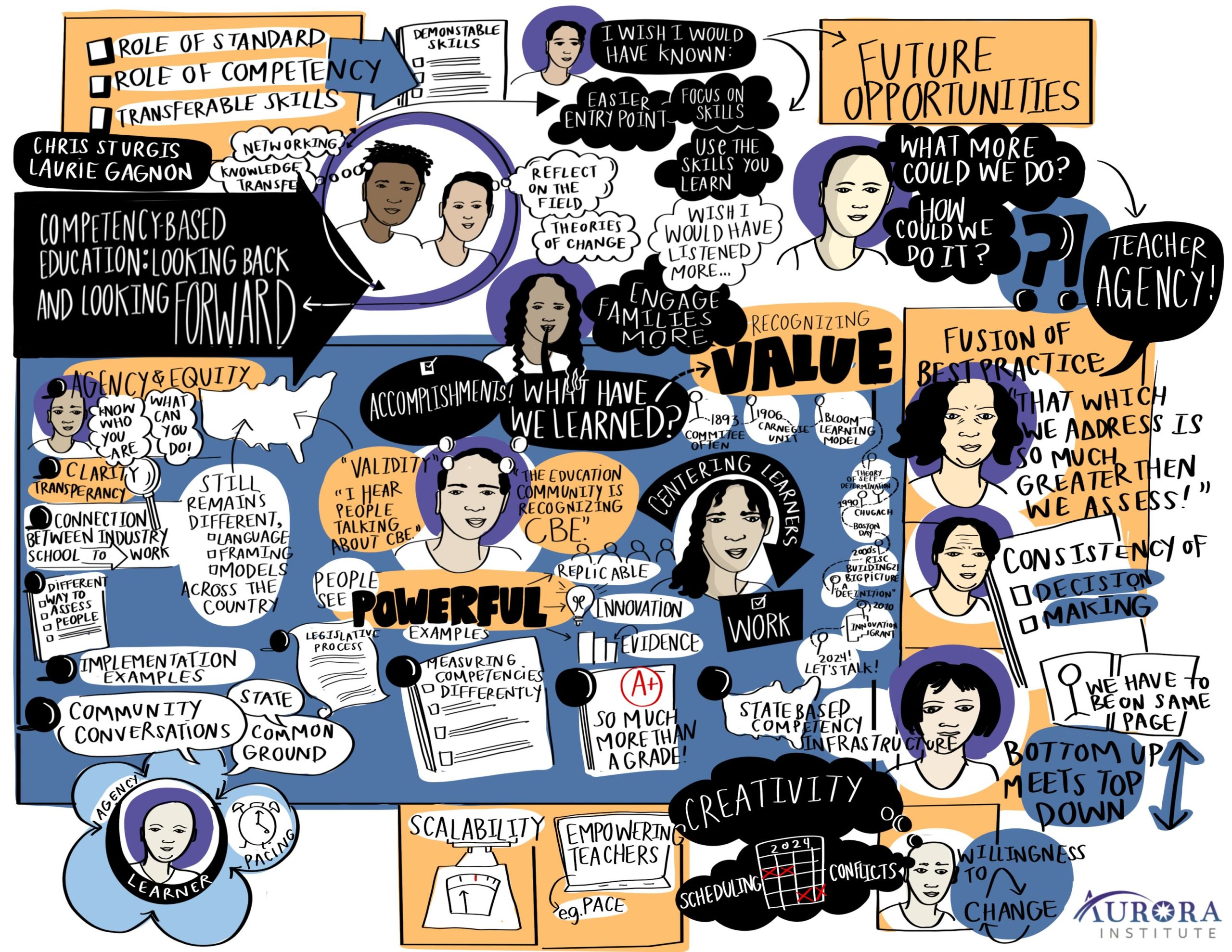The Field of Competency-Based Education Is In Motion
CompetencyWorks Blog

Check out the animated version of the Competency-Based Education: Looking Back, Looking Forward session graphic notes drawn by a local New Orleans artist. This post is part of our Aurora Institute Symposium 2024 series sharing ideas from #Aurora24 sessions.
What a thrill it was to touch down in NOLA for the Aurora Institute Symposium 2024! One big takeaway? Our field has made incredible strides – and we’re standing on the edge of even bigger leaps. Someone even said that we were moving beyond the tipping point! (This raises a big point: If we are moving past the initial stage of focusing on innovators, perhaps we should be rethinking how our field works together.) Hats off to everyone who has poured their creativity, dedication, and collaboration into making real change. You’re truly moving the needle!
On Sunday, Laurie Gagnon and I led a session called Competency-Based Education: Looking Back, Looking Forward to reflect on our achievements and explore new horizons. Here are three big changes from the past 5-10 years that stood out in our conversation and throughout the conference. What would you add to this list? (See Part 2 Looking Forward tomorrow)
State Policy: So Much in Motion!
There’s a whirlwind of action in state policy right now! Every year, more states are investing in efforts to introduce and expand competency-based education (CBE). Some are still focused on innovation grants, while others are doing groundbreaking work aligning the state policy framework with personalized, competency-based education – or as I like to think about it, aligning with the research about how we learn.
At the Symposium, states like North Dakota, South Carolina, and Washington took the spotlight for their progress. Vermont is steadfastly advancing its proficiency-based framework, a vision it first embraced over two decades ago. Meanwhile, Utah’s developed a unique distributive leadership model, fostering partnerships with districts and schools. Big news is that the New York’s Regents are finally shaking things up by updating their test-based graduation policies to offer new paths, like capstone projects, community service, and work-based learning. Keep an eye on Montana and Wyoming as well.
On the federal level, the government is currently supporting innovative state assessment strategies through the Competitive Grants for State Assessments (CGSA) program. While it’s hard to predict what the next four years might bring in federal policy, states are where the action is. The landscape is changing fast – and there’s no slowing down!
Leaping over Obstacles with AI-Solutions
AI is one of the biggest questions facing education. To better understand it, I’ve been using it to help me with research for a book. I’m grateful when it hands me beautifully packaged summaries but also aware that I didn’t do much in the way of learning (and contributed to the demand for more nuclear energy). Very little went into long term memory. Very little connection was made to my schema of knowledge. I can imagine it as a new method for schools to cover more and more content.
Innovators in our field are already leveraging AI to solve two of teachers’ biggest resource challenges: time and creativity. The Symposium highlighted several AI tools, including: providing rapid feedback on student essays and managing revisions; helping students organize projects to showcase their learning; supporting teachers in Universal Design for Learning (UDL)’s backward design process; and accelerating the design of high-quality project-based learning. This topic deserves its own article, so look for Overcoming Barriers with AI in the coming weeks.
Going Deeper: From Working Definition to Shared Understanding
There’s an exciting shift as more people rally around a shared understanding of competency-based education. We’ve been depending heavily on the working definition (created in 2011 and updated in 2019) to describe CBE. However, I was delighted to hear people talk about CBE in their own terms and with a richness that demonstrated their deep understanding.
Here’s a glimpse of the conversation in our session:
- Growth: Everything is focused on how CBE helps students learn and thrive, no longer getting lost in the technical aspects of grading.
- Whole Child: Well-being and social-emotional development are valued alongside academics.
- Equity: It’s the guiding star where every decision takes into account how we can make learning happen for each and every student.
- Student Agency: Essential for creating a vibrant, high-quality CBE environment.
- Real-World Learning: Engagement balloons when students make meaningful connections between academics and real life.
- Skills, Skills, and More Skills: Students aren’t just learning content – they’re mastering how to learn, building transferable skills, and applying academic knowledge to real-world problems.
- Clarity: Clear learning goals empower students to make informed decisions about their paths.
- Flexible Assessment: More schools than ever are using different methods to gauge growth beyond traditional tests.
- Implementation Knowledge: As a field, we’re building a collective toolkit to deepen our expertise in designing and implementing CBE systems.
~~~
These are just a few examples of the momentum that is building for personalized, competency-based education. What would you add? Share your accomplishments and where the energy is in your school, district, or state. Let’s celebrate each other’s efforts – this is how we learn, how we connect, and how we build a collective foundation of knowledge.
Learn more
- At the Aurora Institute Symposium 2024, A Call to Center Young People and Transform K-12 Systems
- Aurora Institute’s 2024 State Policy Priorities
- Illustrating the Competency-Based Education Definition
 Chris Sturgis has spent her professional life building national collaborative efforts to bring about improvements in the education system. She was one of the leaders in creating the policies for multiple pathways to graduation. As co-chair, she enabled the philanthropic members of the Youth Transition Funders Group to work together across the sectors of juvenile justice, foster care, education, and workforce development toward a vision of Connected by 25. Most recently, she co-founded CompetencyWorks, the go-to source about competency education. In 2018, she was awarded Outstanding Individual Contribution to Personalized Learning Award by iNACOL.
Chris Sturgis has spent her professional life building national collaborative efforts to bring about improvements in the education system. She was one of the leaders in creating the policies for multiple pathways to graduation. As co-chair, she enabled the philanthropic members of the Youth Transition Funders Group to work together across the sectors of juvenile justice, foster care, education, and workforce development toward a vision of Connected by 25. Most recently, she co-founded CompetencyWorks, the go-to source about competency education. In 2018, she was awarded Outstanding Individual Contribution to Personalized Learning Award by iNACOL.